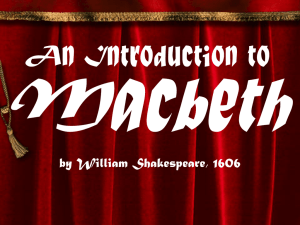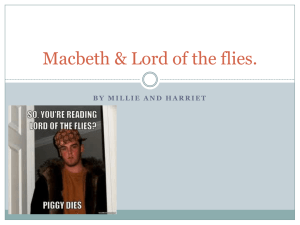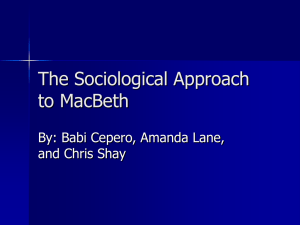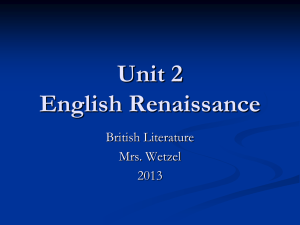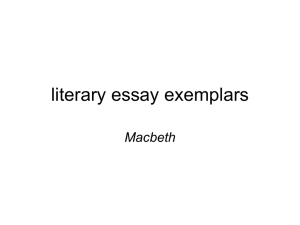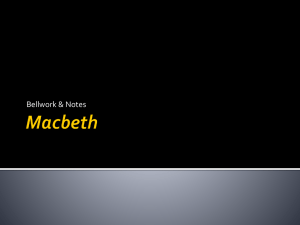Lady Macbeth`s
advertisement
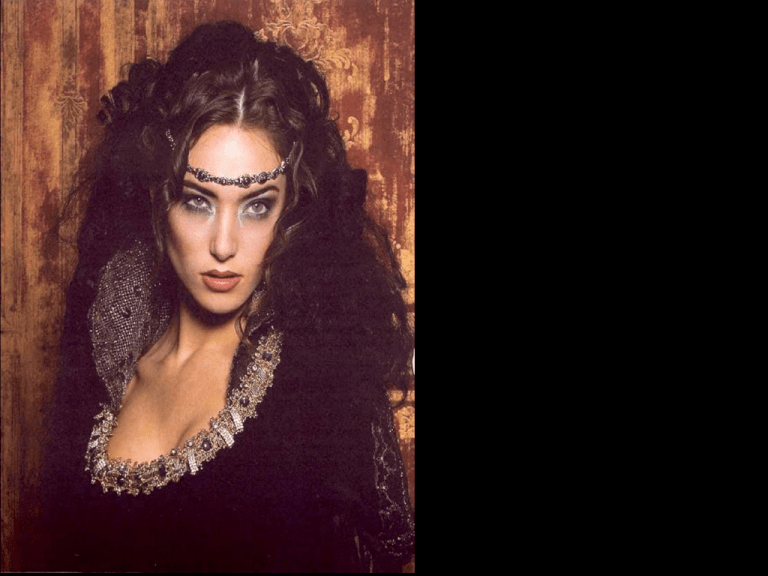
Exploring Female Characters • Women in Shakespeare’s plays are either characterised as meek and mild or ambitious and devious • Shakespeare sees dominant women as evil, unnatural and destructive as many other men did in the 16th and 17th centuries • Shakespeare feels they must be punished and this is what we see throughout this play let’s examine the audiences perception of women at the time Completely Obeyed their husband’s every decision. No influence. Dominated by their father and then their husbands. Avid follower of religion. Life is ruled by the traditions of Christianity. against violence of any sorts. No say in the finer details of married life; money, land etc. Mother & care giver. • Shakespeare’s presentation of women in his plays demonstrates his feelings about women and their roles in society. • Women had less freedom than their male counterparts in Shakespeare's Time. • Women are never totally free in Shakespeare’s plays: if not owned by husbands and fathers, many low class characters are owned by their employers. • Women in power are treated with distrust by Shakespeare. • They have questionable morals. For example, Gertrude in Hamlet marries her husband’s murdering brother and Lady Macbeth coerces her husband into murder • For these women, the penalty for their scheming ways is normally death. Meek and Mild Juliet (Romeo and Juliet) Ophelia (Hamlet) Desdemona (Othello) Bianca (Taming of the Shrew) Gertrude (Hamlet) Miranda (The Tempest) Dominant and Ambitious Lady Macbeth (Macbeth) Catherina (Taming of the Shrew) Emilia (Othello) Compare the way disturbed characters are presented in Macbeth and in the monologues of Carol Ann Duffy. Why Lady Macbeth is such an interesting character: • Lady Macbeth is one of Shakespeare’s most famous and frightening female characters. • When we first see her, she is already plotting Duncan’s murder, and she is stronger, more ruthless, and more ambitious than her husband. • She seems fully aware of this and knows that she will have to push Macbeth into committing murder. • At one point, she wishes that she was not a woman so that she could do it herself. • This theme of the relationship between gender and power is key to Lady Macbeth’s character. • Her husband implies that she is a masculine soul inhabiting a female body, which seems to link masculinity to ambition and violence. • Lady Macbeth manipulates her husband with remarkable effectiveness, overriding all his objections; when he hesitates to murder, she repeatedly questions his manhood until he feels that he must commit murder to prove himself. • Lady Macbeth’s remarkable strength of will persists through the murder of the king—it is she who steadies her husband’s nerves immediately after the crime has been committed. • Afterward, however, she begins a slow slide into madness— just as ambition affects her more strongly than Macbeth before the crime, so does guilt plague her more strongly afterward. • By the close of the play, she has been reduced to sleepwalking through the castle, desperately trying to wash away an invisible bloodstain. • Once the sense of guilt takes over, Lady Macbeth’s sensitivity becomes a weakness, and she is unable to cope. • Significantly, she (apparently) kills herself, signalling her total inability to deal with the legacy of their crimes Exploring Lady Macbeth – A modern audience • Today we see ambitious dominant women as normal human beings. • They are respected just as other people are and even respected more because people feel that once women have their heart set on something they long for it, like Lady Macbeth and her ambition to become Queen. Act 1 Scene 5 Lady Macbeth. Act 1 Scene 5 Lady Macbeth reads a letter from Macbeth that explains his meeting with the Witches. She fears that his nature is not ruthless enough to murder Duncan and assure the completion of the witches' prophecy. “yet do I fear thy nature, It is too full o’ th’ milk of human kindness To catch the nearest way” (Act 1 scene 5 lines 16-18) What does Lady Macbeth’s soliloquy reveal about her character, her plans for Macbeth and her ambitions? “Hie thee hither, That I may pour my spirits in thine ear And chastise with the valour of my tongue All that impedes thee from the golden round” (Act 1 scene 5 lines 25-28) Language Analysis - Semantic Field Lady Macbeth’s Soliloquy What do these words suggest? What do they show about her intentions? How do they compare? Stereotypical? Obeying to traditional belief? USE QUOTATIONS Typical 16th century woman Devoted to being a woman. Embraces womanhood. Against violence No influence over their husbands Care giver Lady Macbeth No desire to be typically womanly; needs to rid herself of womanly emotions to commit evil. ‘’Unsex me here’’. Act 1 Scene 7 Macbeth is reluctant to commit the murder, “We will proceed no further in this business.” Lady Macbeth’s angry response clearly refers to the ever present theme of ambition. “Was the hope drunk Wherein you dress’d yourself?” (Act 1 scene 7 lines 3536) She mocks her husband’s lack of courage and in a chilling image declares she would do anything if she had made a promise to Macbeth. What does this show about her character? “I would, while it was smiling in my face, Have plucked my nipple from his boneless gums And dashed the brains out, had I so sworn As you have done to this.” (Act 1 Scene 7 lines 56-59) Consider the effect this imagery has on the audience? 1) What does this reveal about Lady Macbeth’s character? 2)Why is this image so shocking? 3) What effect does this speech have on Macbeth? Activity – persuasive techniques from Mrs Macbeth… • Look at both your scenes; scenes 5 & 7. Assess Lady Macbeth’s persuasive technique and the effectiveness of her words. Complete the analysis sheet – try and include as much information as possible; the more you can include in your essay the better!!! Act 5 Scene 1 • The first scene in the tragedy's 5th act, the sleepwalking scene is written principally in prose, and follows the guilt-wracked, sleepwalking Lady Macbeth as she recollects horrific images and impressions from her past. The scene is Lady Macbeth's last onstage appearance, though her death is reported later in the act. • Look at Act 5 scene of Macbeth. What is the Unit1outline state of Lady Macbeth’s mind? • Which words and phrases are most effective in showing her state of mind? • How would an audience feel about her in this scene?




